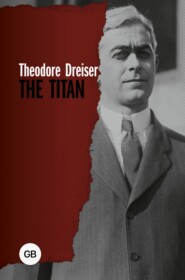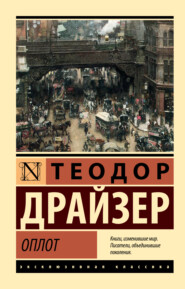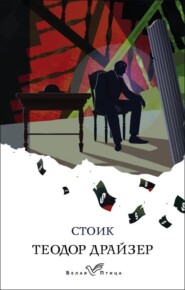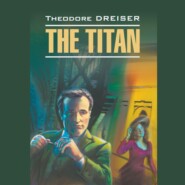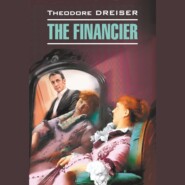По всем вопросам обращайтесь на: info@litportal.ru
(©) 2003-2025.
✖
The Financier / Финансист
Настройки чтения
Размер шрифта
Высота строк
Поля
He paused and looked tantalizingly out of the window, knowing full well Cowperwood was greatly interested, and that this talk of political influence and connections could only whet his appetite. Butler wanted him to see clearly that fidelity was the point in this case—fidelity, tact, subtlety, and concealment.
“Well, if you have been looking into my record,” observed Cowperwood, with his own elusive smile, leaving the thought suspended.
Butler felt the force of the temperament and the argument. He liked the young man’s poise and balance. A number of people had spoken of Cowperwood to him. (It was now Cowperwood & Co. The company was fiction purely.) He asked him something about the street; how the market was running; what he knew about street-railways. Finally he outlined his plan of buying all he could of the stock of two given lines—the Ninth and Tenth and the Fifteenth and Sixteenth—without attracting any attention, if possible. It was to be done slowly, part on ’change, part from individual holders. He did not tell him that there was a certain amount of legislative pressure he hoped to bring to bear to get him franchises for extensions in the regions beyond where the lines now ended, in order that when the time came for them to extend their facilities they would have to see him or his sons, who might be large minority stockholders in these very concerns. It was a far-sighted plan, and meant that the lines would eventually drop into his or his sons’ basket.
“I’ll be delighted to work with you, Mr. Butler, in any way that you may suggest,” observed Cowperwood. “I can’t say that I have so much of a business as yet—merely prospects. But my connections are good. I am now a member of the New York and Philadelphia exchanges. Those who have dealt with me seem to like the results I get.”
“I know a little something about your work already,” reiterated Butler, wisely.
“Very well, then; whenever you have a commission you can call at my office, or write, or I will call here. I will give you my secret operating code, so that anything you say will be strictly confidential.”
“Well, we’ll not say anything more now. In a few days I’ll have somethin’ for you. When I do, you can draw on my bank for what you need, up to a certain amount.” He got up and looked out into the street, and Cowperwood also arose.
“It’s a fine day now, isn’t it?”
“It surely is.”
“Well, we’ll get to know each other better, I’m sure.”
He held out his hand.
“I hope so.”
Cowperwood went out, Butler accompanying him to the door. As he did so a young girl bounded in from the street, red-cheeked, blue-eyed, wearing a scarlet cape with the peaked hood thrown over her red-gold hair.
“Oh, daddy, I almost knocked you down.”
She gave her father, and incidentally Cowperwood, a gleaming, radiant, inclusive smile. Her teeth were bright and small, and her lips bud-red.
“You’re home early. I thought you were going to stay all day?”
“I was, but I changed my mind.”
She passed on in, swinging her arms.
“Yes, well—” Butler continued, when she had gone. “Then well leave it for a day or two. Good day.”
“Good day.”
Cowperwood, warm with this enhancing of his financial prospects, went down the steps; but incidentally he spared a passing thought for the gay spirit of youth that had manifested itself in this red-cheeked maiden. What a bright, healthy, bounding girl! Her voice had the subtle, vigorous ring of fifteen or sixteen. She was all vitality. What a fine catch for some young fellow some day, and her father would make him rich, no doubt, or help to.
Chapter XII
It was to Edward Malia Butler that Cowperwood turned now, some nineteen months later when he was thinking of the influence that might bring him an award of a portion of the State issue of bonds. Butler could probably be interested to take some of them himself, or could help him place some. He had come to like Cowperwood very much and was now being carried on the latter’s books as a prospective purchaser of large blocks of stocks. And Cowperwood liked this great solid Irishman. He liked his history. He had met Mrs. Butler, a rather fat and phlegmatic Irish woman with a world of hard sense who cared nothing at all for show and who still liked to go into the kitchen and superintend the cooking. He had met Owen and Callum Butler, the boys, and Aileen and Norah, the girls. Aileen was the one who had bounded up the steps the first day he had called at the Butler house several seasons before.
There was a cozy grate-fire burning in Butler’s improvised private office when Cowperwood called. Spring was coming on, but the evenings were cool. The older man invited Cowperwood to make himself comfortable in one of the large leather chairs before the fire and then proceeded to listen to his recital of what he hoped to accomplish.
“Well, now, that isn’t so easy,” he commented at the end. “You ought to know more about that than I do. I’m not a financier, as you well know.” And he grinned apologetically.
“It’s a matter of influence,” went on Cowperwood. “And favoritism. That I know. Drexel & Company and Cooke & Company have connections at Harrisburg. They have men of their own looking after their interests. The attorney-general and the State treasurer are hand in glove with them. Even if I put in a bid, and can demonstrate that I can handle the loan, it won’t help me to get it. Other people have done that. I have to have friends—influence. You know how it is.”
“Them things,” Butler said, “is easy enough if you know the right parties to approach. Now there’s Jimmy Oliver—he ought to know something about that.” Jimmy Oliver was the whilom district attorney serving at this time, and incidentally free adviser to Mr. Butler in many ways. He was also, accidentally, a warm personal friend of the State treasurer.
“How much of the loan do you want?”
“Five million.”
“Five million!” Butler sat up. “Man, what are you talking about? That’s a good deal of money. Where are you going to sell all that?”
“I want to bid for five million,” assuaged Cowperwood, softly. “I only want one million but I want the prestige of putting in a bona fide bid for five million. It will do me good on the street.”
Butler sank back somewhat relieved.
“Five million! Prestige! You want one million. Well, now, that’s different. That’s not such a bad idea. We ought to be able to get that.”
He rubbed his chin some more and stared into the fire.
And Cowperwood felt confident when he left the house that evening that Butler would not fail him but would set the wheels working. Therefore, he was not surprised, and knew exactly what it meant, when a few days later he was introduced to City Treasurer Julian Bode, who promised to introduce him to State Treasurer Van Nostrand and to see that his claims to consideration were put before the people. “Of course, you know,” he said to Cowperwood, in the presence of Butler, for it was at the latter’s home that the conference took place, “this banking crowd is very powerful. You know who they are. They don’t want any interference in this bond issue business. I was talking to Terrence Relihan, who represents them up there”—meaning Harrisburg, the State capital—“and he says they won’t stand for it at all. You may have trouble right here in Philadelphia after you get it—they’re pretty powerful, you know. Are you sure just where you can place it?”
“Yes, I’m sure,” replied Cowperwood.
“Well, the best thing in my judgment is not to say anything at all. Just put in your bid. Van Nostrand, with the governor’s approval, will make the award. We can fix the governor, I think. After you get it they may talk to you personally, but that’s your business.”
Cowperwood smiled his inscrutable smile. There were so many ins and outs to this financial life. It was an endless network of underground holes, along which all sorts of influences were moving. A little wit, a little nimbleness, a little luck-time and opportunity—these sometimes availed. Here he was, through his ambition to get on, and nothing else, coming into contact with the State treasurer and the governor. They were going to consider his case personally, because he demanded that it be considered—nothing more. Others more influential than himself had quite as much right to a share, but they didn’t take it. Nerve, ideas, aggressiveness, how these counted when one had luck!
He went away thinking how surprised Drexel & Co. and Cooke & Co. would be to see him appearing in the field as a competitor. In his home, in a little room on the second floor next his bedroom, which he had fixed up as an office with a desk, a safe, and a leather chair, he consulted his resources. There were so many things to think of. He went over again the list of people whom he had seen and whom he could count on to subscribe, and in so far as that was concerned—the award of one million dollars—he was safe. He figured to make two per cent. on the total transaction, or twenty thousand dollars. If he did he was going to buy a house out on Girard Avenue beyond the Butlers’, or, better yet, buy a piece of ground and erect one; mortgaging house and property so to do. His father was prospering nicely. He might want to build a house next to him, and they could live side by side. His own business, aside from this deal, would yield him ten thousand dollars this year. His street-car investments, aggregating fifty thousand, were paying six per cent. His wife’s property, represented by this house, some government bonds, and some real estate in West Philadelphia amounted to forty thousand more. Between them they were rich; but he expected to be much richer. All he needed now was to keep cool. If he succeeded in this bond-issue matter, he could do it again and on a larger scale. There would be more issues. He turned out the light after a while and went into his wife’s boudoir, where she was sleeping. The nurse and the children were in a room beyond.
“Well, Lillian,” he observed, when she awoke and turned over toward him, “I think I have that bond matter that I was telling you about arranged at last. I think I’ll get a million of it, anyhow. That’ll mean twenty thousand. If I do we’ll build out on Girard Avenue. That’s going to be the street. The college is making that neighborhood.”
“That’ll be fine, won’t it, Frank!” she observed, and rubbed his arm as he sat on the side of the bed.
Her remark was vaguely speculative.
“We’ll have to show the Butlers some attention from now on. He’s been very nice to me and he’s going to be useful—I can see that. He asked me to bring you over some time. We must go. Be nice to his wife. He can do a lot for me if he wants to. He has two daughters, too. We’ll have to have them over here.”
“I’ll have them to dinner sometime,” she agreed cheerfully and helpfully, “and I’ll stop and take Mrs. Butler driving if she’ll go, or she can take me.”
She had already learned that the Butlers were rather showy—the younger generation—that they were sensitive as to their lineage, and that money in their estimation was supposed to make up for any deficiency in any other respect. “Butler himself is a very presentable man,” Cowperwood had once remarked to her, “but Mrs. Butler—well, she’s all right, but she’s a little commonplace. She’s a fine woman, though, I think, good-natured and good-hearted.” He cautioned her not to overlook Aileen and Norah, because the Butlers, mother and father, were very proud of them.
Mrs. Cowperwood at this time was thirty-two years old; Cowperwood twenty-seven. The birth and care of two children had made some difference in her looks. She was no longer as softly pleasing, more angular. Her face was hollow-cheeked, like so many of Rossetti’s and Burne-Jones’s women. Her health was really not as good as it had been—the care of two children and a late undiagnosed tendency toward gastritis having reduced her. In short she was a little run down nervously and suffered from fits of depression. Cowperwood had noticed this. He tried to be gentle and considerate, but he was too much of a utilitarian and practical-minded observer not to realize that he was likely to have a sickly wife on his hands later. Sympathy and affection were great things, but desire and charm must endure or one was compelled to be sadly conscious of their loss. So often now he saw young girls who were quite in his mood, and who were exceedingly robust and joyous. It was fine, advisable, practical, to adhere to the virtues as laid down in the current social lexicon, but if you had a sickly wife—And anyhow, was a man entitled to only one wife? Must he never look at another woman? Supposing he found some one? He pondered those things between hours of labor, and concluded that it did not make so much difference. If a man could, and not be exposed, it was all right. He had to be careful, though. Tonight, as he sat on the side of his wife’s bed, he was thinking somewhat of this, for he had seen Aileen Butler again, playing and singing at her piano as he passed the parlor door. She was like a bright bird radiating health and enthusiasm—a reminder of youth in general.
“It’s a strange world,” he thought; but his thoughts were his own, and he didn’t propose to tell any one about them.
The bond issue, when it came, was a curious compromise; for, although it netted him his twenty thousand dollars and more and served to introduce him to the financial notice of Philadelphia and the State of Pennsylvania, it did not permit him to manipulate the subscriptions as he had planned. The State treasurer was seen by him at the office of a local lawyer of great repute, where he worked when in the city. He was gracious to Cowperwood, because he had to be. He explained to him just how things were regulated at Harrisburg. The big financiers were looked to for campaign funds. They were represented by henchmen in the State assembly and senate. The governor and the treasurer were foot-free; but there were other influences—prestige, friendship, social power, political ambitions, etc. The big men might constitute a close corporation, which in itself was unfair; but, after all, they were the legitimate sponsors for big money loans of this kind. The State had to keep on good terms with them, especially in times like these. Seeing that Mr. Cowperwood was so well able to dispose of the million he expected to get, it would be perfectly all right to award it to him; but Van Nostrand had a counter-proposition to make. Would Cowperwood, if the financial crowd now handling the matter so desired, turn over his award to them for a consideration—a sum equal to what he expected to make—in the event the award was made to him? Certain financiers desired this. It was dangerous to oppose them. They were perfectly willing he should put in a bid for five million and get the prestige of that; to have him awarded one million and get the prestige of that was well enough also, but they desired to handle the twenty-three million dollars in an unbroken lot. It looked better. He need not be advertised as having withdrawn. They would be content to have him achieve the glory of having done what he started out to do. Just the same the example was bad. Others might wish to imitate him. If it were known in the street privately that he had been coerced, for a consideration, into giving up, others would be deterred from imitating him in the future. Besides, if he refused, they could cause him trouble. His loans might be called. Various banks might not be so friendly in the future. His constituents might be warned against him in one way or another.
Cowperwood saw the point. He acquiesced. It was something to have brought so many high and mighties to their knees. So they knew of him! They were quite well aware of him! Well and good. He would take the award and twenty thousand or thereabouts and withdraw. The State treasurer was delighted. It solved a ticklish proposition for him.
“I’m glad to have seen you,” he said. “I’m glad we’ve met. I’ll drop in and talk with you some time when I’m down this way. We’ll have lunch together.”
“Well, if you have been looking into my record,” observed Cowperwood, with his own elusive smile, leaving the thought suspended.
Butler felt the force of the temperament and the argument. He liked the young man’s poise and balance. A number of people had spoken of Cowperwood to him. (It was now Cowperwood & Co. The company was fiction purely.) He asked him something about the street; how the market was running; what he knew about street-railways. Finally he outlined his plan of buying all he could of the stock of two given lines—the Ninth and Tenth and the Fifteenth and Sixteenth—without attracting any attention, if possible. It was to be done slowly, part on ’change, part from individual holders. He did not tell him that there was a certain amount of legislative pressure he hoped to bring to bear to get him franchises for extensions in the regions beyond where the lines now ended, in order that when the time came for them to extend their facilities they would have to see him or his sons, who might be large minority stockholders in these very concerns. It was a far-sighted plan, and meant that the lines would eventually drop into his or his sons’ basket.
“I’ll be delighted to work with you, Mr. Butler, in any way that you may suggest,” observed Cowperwood. “I can’t say that I have so much of a business as yet—merely prospects. But my connections are good. I am now a member of the New York and Philadelphia exchanges. Those who have dealt with me seem to like the results I get.”
“I know a little something about your work already,” reiterated Butler, wisely.
“Very well, then; whenever you have a commission you can call at my office, or write, or I will call here. I will give you my secret operating code, so that anything you say will be strictly confidential.”
“Well, we’ll not say anything more now. In a few days I’ll have somethin’ for you. When I do, you can draw on my bank for what you need, up to a certain amount.” He got up and looked out into the street, and Cowperwood also arose.
“It’s a fine day now, isn’t it?”
“It surely is.”
“Well, we’ll get to know each other better, I’m sure.”
He held out his hand.
“I hope so.”
Cowperwood went out, Butler accompanying him to the door. As he did so a young girl bounded in from the street, red-cheeked, blue-eyed, wearing a scarlet cape with the peaked hood thrown over her red-gold hair.
“Oh, daddy, I almost knocked you down.”
She gave her father, and incidentally Cowperwood, a gleaming, radiant, inclusive smile. Her teeth were bright and small, and her lips bud-red.
“You’re home early. I thought you were going to stay all day?”
“I was, but I changed my mind.”
She passed on in, swinging her arms.
“Yes, well—” Butler continued, when she had gone. “Then well leave it for a day or two. Good day.”
“Good day.”
Cowperwood, warm with this enhancing of his financial prospects, went down the steps; but incidentally he spared a passing thought for the gay spirit of youth that had manifested itself in this red-cheeked maiden. What a bright, healthy, bounding girl! Her voice had the subtle, vigorous ring of fifteen or sixteen. She was all vitality. What a fine catch for some young fellow some day, and her father would make him rich, no doubt, or help to.
Chapter XII
It was to Edward Malia Butler that Cowperwood turned now, some nineteen months later when he was thinking of the influence that might bring him an award of a portion of the State issue of bonds. Butler could probably be interested to take some of them himself, or could help him place some. He had come to like Cowperwood very much and was now being carried on the latter’s books as a prospective purchaser of large blocks of stocks. And Cowperwood liked this great solid Irishman. He liked his history. He had met Mrs. Butler, a rather fat and phlegmatic Irish woman with a world of hard sense who cared nothing at all for show and who still liked to go into the kitchen and superintend the cooking. He had met Owen and Callum Butler, the boys, and Aileen and Norah, the girls. Aileen was the one who had bounded up the steps the first day he had called at the Butler house several seasons before.
There was a cozy grate-fire burning in Butler’s improvised private office when Cowperwood called. Spring was coming on, but the evenings were cool. The older man invited Cowperwood to make himself comfortable in one of the large leather chairs before the fire and then proceeded to listen to his recital of what he hoped to accomplish.
“Well, now, that isn’t so easy,” he commented at the end. “You ought to know more about that than I do. I’m not a financier, as you well know.” And he grinned apologetically.
“It’s a matter of influence,” went on Cowperwood. “And favoritism. That I know. Drexel & Company and Cooke & Company have connections at Harrisburg. They have men of their own looking after their interests. The attorney-general and the State treasurer are hand in glove with them. Even if I put in a bid, and can demonstrate that I can handle the loan, it won’t help me to get it. Other people have done that. I have to have friends—influence. You know how it is.”
“Them things,” Butler said, “is easy enough if you know the right parties to approach. Now there’s Jimmy Oliver—he ought to know something about that.” Jimmy Oliver was the whilom district attorney serving at this time, and incidentally free adviser to Mr. Butler in many ways. He was also, accidentally, a warm personal friend of the State treasurer.
“How much of the loan do you want?”
“Five million.”
“Five million!” Butler sat up. “Man, what are you talking about? That’s a good deal of money. Where are you going to sell all that?”
“I want to bid for five million,” assuaged Cowperwood, softly. “I only want one million but I want the prestige of putting in a bona fide bid for five million. It will do me good on the street.”
Butler sank back somewhat relieved.
“Five million! Prestige! You want one million. Well, now, that’s different. That’s not such a bad idea. We ought to be able to get that.”
He rubbed his chin some more and stared into the fire.
And Cowperwood felt confident when he left the house that evening that Butler would not fail him but would set the wheels working. Therefore, he was not surprised, and knew exactly what it meant, when a few days later he was introduced to City Treasurer Julian Bode, who promised to introduce him to State Treasurer Van Nostrand and to see that his claims to consideration were put before the people. “Of course, you know,” he said to Cowperwood, in the presence of Butler, for it was at the latter’s home that the conference took place, “this banking crowd is very powerful. You know who they are. They don’t want any interference in this bond issue business. I was talking to Terrence Relihan, who represents them up there”—meaning Harrisburg, the State capital—“and he says they won’t stand for it at all. You may have trouble right here in Philadelphia after you get it—they’re pretty powerful, you know. Are you sure just where you can place it?”
“Yes, I’m sure,” replied Cowperwood.
“Well, the best thing in my judgment is not to say anything at all. Just put in your bid. Van Nostrand, with the governor’s approval, will make the award. We can fix the governor, I think. After you get it they may talk to you personally, but that’s your business.”
Cowperwood smiled his inscrutable smile. There were so many ins and outs to this financial life. It was an endless network of underground holes, along which all sorts of influences were moving. A little wit, a little nimbleness, a little luck-time and opportunity—these sometimes availed. Here he was, through his ambition to get on, and nothing else, coming into contact with the State treasurer and the governor. They were going to consider his case personally, because he demanded that it be considered—nothing more. Others more influential than himself had quite as much right to a share, but they didn’t take it. Nerve, ideas, aggressiveness, how these counted when one had luck!
He went away thinking how surprised Drexel & Co. and Cooke & Co. would be to see him appearing in the field as a competitor. In his home, in a little room on the second floor next his bedroom, which he had fixed up as an office with a desk, a safe, and a leather chair, he consulted his resources. There were so many things to think of. He went over again the list of people whom he had seen and whom he could count on to subscribe, and in so far as that was concerned—the award of one million dollars—he was safe. He figured to make two per cent. on the total transaction, or twenty thousand dollars. If he did he was going to buy a house out on Girard Avenue beyond the Butlers’, or, better yet, buy a piece of ground and erect one; mortgaging house and property so to do. His father was prospering nicely. He might want to build a house next to him, and they could live side by side. His own business, aside from this deal, would yield him ten thousand dollars this year. His street-car investments, aggregating fifty thousand, were paying six per cent. His wife’s property, represented by this house, some government bonds, and some real estate in West Philadelphia amounted to forty thousand more. Between them they were rich; but he expected to be much richer. All he needed now was to keep cool. If he succeeded in this bond-issue matter, he could do it again and on a larger scale. There would be more issues. He turned out the light after a while and went into his wife’s boudoir, where she was sleeping. The nurse and the children were in a room beyond.
“Well, Lillian,” he observed, when she awoke and turned over toward him, “I think I have that bond matter that I was telling you about arranged at last. I think I’ll get a million of it, anyhow. That’ll mean twenty thousand. If I do we’ll build out on Girard Avenue. That’s going to be the street. The college is making that neighborhood.”
“That’ll be fine, won’t it, Frank!” she observed, and rubbed his arm as he sat on the side of the bed.
Her remark was vaguely speculative.
“We’ll have to show the Butlers some attention from now on. He’s been very nice to me and he’s going to be useful—I can see that. He asked me to bring you over some time. We must go. Be nice to his wife. He can do a lot for me if he wants to. He has two daughters, too. We’ll have to have them over here.”
“I’ll have them to dinner sometime,” she agreed cheerfully and helpfully, “and I’ll stop and take Mrs. Butler driving if she’ll go, or she can take me.”
She had already learned that the Butlers were rather showy—the younger generation—that they were sensitive as to their lineage, and that money in their estimation was supposed to make up for any deficiency in any other respect. “Butler himself is a very presentable man,” Cowperwood had once remarked to her, “but Mrs. Butler—well, she’s all right, but she’s a little commonplace. She’s a fine woman, though, I think, good-natured and good-hearted.” He cautioned her not to overlook Aileen and Norah, because the Butlers, mother and father, were very proud of them.
Mrs. Cowperwood at this time was thirty-two years old; Cowperwood twenty-seven. The birth and care of two children had made some difference in her looks. She was no longer as softly pleasing, more angular. Her face was hollow-cheeked, like so many of Rossetti’s and Burne-Jones’s women. Her health was really not as good as it had been—the care of two children and a late undiagnosed tendency toward gastritis having reduced her. In short she was a little run down nervously and suffered from fits of depression. Cowperwood had noticed this. He tried to be gentle and considerate, but he was too much of a utilitarian and practical-minded observer not to realize that he was likely to have a sickly wife on his hands later. Sympathy and affection were great things, but desire and charm must endure or one was compelled to be sadly conscious of their loss. So often now he saw young girls who were quite in his mood, and who were exceedingly robust and joyous. It was fine, advisable, practical, to adhere to the virtues as laid down in the current social lexicon, but if you had a sickly wife—And anyhow, was a man entitled to only one wife? Must he never look at another woman? Supposing he found some one? He pondered those things between hours of labor, and concluded that it did not make so much difference. If a man could, and not be exposed, it was all right. He had to be careful, though. Tonight, as he sat on the side of his wife’s bed, he was thinking somewhat of this, for he had seen Aileen Butler again, playing and singing at her piano as he passed the parlor door. She was like a bright bird radiating health and enthusiasm—a reminder of youth in general.
“It’s a strange world,” he thought; but his thoughts were his own, and he didn’t propose to tell any one about them.
The bond issue, when it came, was a curious compromise; for, although it netted him his twenty thousand dollars and more and served to introduce him to the financial notice of Philadelphia and the State of Pennsylvania, it did not permit him to manipulate the subscriptions as he had planned. The State treasurer was seen by him at the office of a local lawyer of great repute, where he worked when in the city. He was gracious to Cowperwood, because he had to be. He explained to him just how things were regulated at Harrisburg. The big financiers were looked to for campaign funds. They were represented by henchmen in the State assembly and senate. The governor and the treasurer were foot-free; but there were other influences—prestige, friendship, social power, political ambitions, etc. The big men might constitute a close corporation, which in itself was unfair; but, after all, they were the legitimate sponsors for big money loans of this kind. The State had to keep on good terms with them, especially in times like these. Seeing that Mr. Cowperwood was so well able to dispose of the million he expected to get, it would be perfectly all right to award it to him; but Van Nostrand had a counter-proposition to make. Would Cowperwood, if the financial crowd now handling the matter so desired, turn over his award to them for a consideration—a sum equal to what he expected to make—in the event the award was made to him? Certain financiers desired this. It was dangerous to oppose them. They were perfectly willing he should put in a bid for five million and get the prestige of that; to have him awarded one million and get the prestige of that was well enough also, but they desired to handle the twenty-three million dollars in an unbroken lot. It looked better. He need not be advertised as having withdrawn. They would be content to have him achieve the glory of having done what he started out to do. Just the same the example was bad. Others might wish to imitate him. If it were known in the street privately that he had been coerced, for a consideration, into giving up, others would be deterred from imitating him in the future. Besides, if he refused, they could cause him trouble. His loans might be called. Various banks might not be so friendly in the future. His constituents might be warned against him in one way or another.
Cowperwood saw the point. He acquiesced. It was something to have brought so many high and mighties to their knees. So they knew of him! They were quite well aware of him! Well and good. He would take the award and twenty thousand or thereabouts and withdraw. The State treasurer was delighted. It solved a ticklish proposition for him.
“I’m glad to have seen you,” he said. “I’m glad we’ve met. I’ll drop in and talk with you some time when I’m down this way. We’ll have lunch together.”






